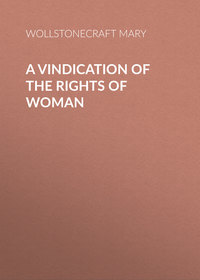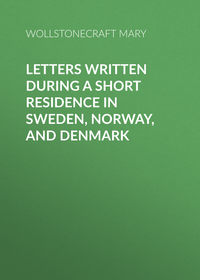 полная версия
полная версияMaria; Or, The Wrongs of Woman
“From the woods and back settlements, I returned to the towns, and learned to eat and drink most valiantly; but without entering into commerce (and I detested commerce) I found I could not live there; and, growing heartily weary of the land of liberty and vulgar aristocracy, seated on her bags of dollars, I resolved once more to visit Europe. I wrote to a distant relation in England, with whom I had been educated, mentioning the vessel in which I intended to sail. Arriving in London, my senses were intoxicated. I ran from street to street, from theater to theater, and the women of the town (again I must beg pardon for my habitual frankness) appeared to me like angels.
“A week was spent in this thoughtless manner, when, returning very late to the hotel in which I had lodged ever since my arrival, I was knocked down in a private street, and hurried, in a state of insensibility, into a coach, which brought me hither, and I only recovered my senses to be treated like one who had lost them. My keepers are deaf to my remonstrances and enquiries, yet assure me that my confinement shall not last long. Still I cannot guess, though I weary myself with conjectures, why I am confined, or in what part of England this house is situated. I imagine sometimes that I hear the sea roar, and wished myself again on the Atlantic, till I had a glimpse of you.” 5
A few moments were only allowed to Maria to comment on this narrative, when Darnford left her to her own thoughts, to the “never ending, still beginning,” task of weighing his words, recollecting his tones of voice, and feeling them reverberate on her heart.
CHAPTER 4
PITY, and the forlorn seriousness of adversity, have both been considered as dispositions favourable to love, while satirical writers have attributed the propensity to the relaxing effect of idleness; what chance then had Maria of escaping, when pity, sorrow, and solitude all conspired to soften her mind, and nourish romantic wishes, and, from a natural progress, romantic expectations?
Maria was six-and-twenty. But, such was the native soundness of her constitution, that time had only given to her countenance the character of her mind. Revolving thought, and exercised affections had banished some of the playful graces of innocence, producing insensibly that irregularity of features which the struggles of the understanding to trace or govern the strong emotions of the heart, are wont to imprint on the yielding mass. Grief and care had mellowed, without obscuring, the bright tints of youth, and the thoughtfulness which resided on her brow did not take from the feminine softness of her features; nay, such was the sensibility which often mantled over it, that she frequently appeared, like a large proportion of her sex, only born to feel; and the activity of her well-proportioned, and even almost voluptuous figure, inspired the idea of strength of mind, rather than of body. There was a simplicity sometimes indeed in her manner, which bordered on infantine ingenuousness, that led people of common discernment to underrate her talents, and smile at the flights of her imagination. But those who could not comprehend the delicacy of her sentiments, were attached by her unfailing sympathy, so that she was very generally beloved by characters of very different descriptions; still, she was too much under the influence of an ardent imagination to adhere to common rules.
There are mistakes of conduct which at five-and-twenty prove the strength of the mind, that, ten or fifteen years after, would demonstrate its weakness, its incapacity to acquire a sane judgment. The youths who are satisfied with the ordinary pleasures of life, and do not sigh after ideal phantoms of love and friendship, will never arrive at great maturity of understanding; but if these reveries are cherished, as is too frequently the case with women, when experience ought to have taught them in what human happiness consists, they become as useless as they are wretched. Besides, their pains and pleasures are so dependent on outward circumstances, on the objects of their affections, that they seldom act from the impulse of a nerved mind, able to choose its own pursuit.
Having had to struggle incessantly with the vices of mankind, Maria’s imagination found repose in pourtraying the possible virtues the world might contain. Pygmalion formed an ivory maid, and longed for an informing soul. She, on the contrary, combined all the qualities of a hero’s mind, and fate presented a statue in which she might enshrine them.
We mean not to trace the progress of this passion, or recount how often Darnford and Maria were obliged to part in the midst of an interesting conversation. Jemima ever watched on the tip-toe of fear, and frequently separated them on a false alarm, when they would have given worlds to remain a little longer together.
A magic lamp now seemed to be suspended in Maria’s prison, and fairy landscapes flitted round the gloomy walls, late so blank. Rushing from the depth of despair, on the seraph wing of hope, she found herself happy.—She was beloved, and every emotion was rapturous.
To Darnford she had not shown a decided affection; the fear of outrunning his, a sure proof of love, made her often assume a coldness and indifference foreign from her character; and, even when giving way to the playful emotions of a heart just loosened from the frozen bond of grief, there was a delicacy in her manner of expressing her sensibility, which made him doubt whether it was the effect of love.
One evening, when Jemima left them, to listen to the sound of a distant footstep, which seemed cautiously to approach, he seized Maria’s hand—it was not withdrawn. They conversed with earnestness of their situation; and, during the conversation, he once or twice gently drew her towards him. He felt the fragrance of her breath, and longed, yet feared, to touch the lips from which it issued; spirits of purity seemed to guard them, while all the enchanting graces of love sported on her cheeks, and languished in her eyes.
Jemima entering, he reflected on his diffidence with poignant regret, and, she once more taking alarm, he ventured, as Maria stood near his chair, to approach her lips with a declaration of love. She drew back with solemnity, he hung down his head abashed; but lifting his eyes timidly, they met her’s; she had determined, during that instant, and suffered their rays to mingle. He took, with more ardour, reassured, a half-consenting, half-reluctant kiss, reluctant only from modesty; and there was a sacredness in her dignified manner of reclining her glowing face on his shoulder, that powerfully impressed him. Desire was lost in more ineffable emotions, and to protect her from insult and sorrow—to make her happy, seemed not only the first wish of his heart, but the most noble duty of his life. Such angelic confidence demanded the fidelity of honour; but could he, feeling her in every pulsation, could he ever change, could he be a villain? The emotion with which she, for a moment, allowed herself to be pressed to his bosom, the tear of rapturous sympathy, mingled with a soft melancholy sentiment of recollected disappointment, said—more of truth and faithfulness, than the tongue could have given utterance to in hours! They were silent—yet discoursed, how eloquently? till, after a moment’s reflection, Maria drew her chair by the side of his, and, with a composed sweetness of voice, and supernatural benignity of countenance, said, “I must open my whole heart to you; you must be told who I am, why I am here, and why, telling you I am a wife, I blush not to”—the blush spoke the rest.
Jemima was again at her elbow, and the restraint of her presence did not prevent an animated conversation, in which love, sly urchin, was ever at bo-peep.
So much of heaven did they enjoy, that paradise bloomed around them; or they, by a powerful spell, had been transported into Armida’s garden. Love, the grand enchanter, “lapt them in Elysium,” and every sense was harmonized to joy and social extacy. So animated, indeed, were their accents of tenderness, in discussing what, in other circumstances, would have been commonplace subjects, that Jemima felt, with surprise, a tear of pleasure trickling down her rugged cheeks. She wiped it away, half ashamed; and when Maria kindly enquired the cause, with all the eager solicitude of a happy being wishing to impart to all nature its overflowing felicity, Jemima owned that it was the first tear that social enjoyment had ever drawn from her. She seemed indeed to breathe more freely; the cloud of suspicion cleared away from her brow; she felt herself, for once in her life, treated like a fellow-creature.
Imagination! who can paint thy power; or reflect the evanescent tints of hope fostered by thee? A despondent gloom had long obscured Maria’s horizon—now the sun broke forth, the rainbow appeared, and every prospect was fair. Horror still reigned in the darkened cells, suspicion lurked in the passages, and whispered along the walls. The yells of men possessed, sometimes, made them pause, and wonder that they felt so happy, in a tomb of living death. They even chid themselves for such apparent insensibility; still the world contained not three happier beings. And Jemima, after again patrolling the passage, was so softened by the air of confidence which breathed around her, that she voluntarily began an account of herself.
CHAPTER 5
“MY FATHER,” said Jemima, “seduced my mother, a pretty girl, with whom he lived fellow-servant; and she no sooner perceived the natural, the dreaded consequence, than the terrible conviction flashed on her—that she was ruined. Honesty, and a regard for her reputation, had been the only principles inculcated by her mother; and they had been so forcibly impressed, that she feared shame, more than the poverty to which it would lead. Her incessant importunities to prevail upon my father to screen her from reproach by marrying her, as he had promised in the fervour of seduction, estranged him from her so completely, that her very person became distasteful to him; and he began to hate, as well as despise me, before I was born.
“My mother, grieved to the soul by his neglect, and unkind treatment, actually resolved to famish herself; and injured her health by the attempt; though she had not sufficient resolution to adhere to her project, or renounce it entirely. Death came not at her call; yet sorrow, and the methods she adopted to conceal her condition, still doing the work of a house-maid, had such an effect on her constitution, that she died in the wretched garret, where her virtuous mistress had forced her to take refuge in the very pangs of labour, though my father, after a slight reproof, was allowed to remain in his place—allowed by the mother of six children, who, scarcely permitting a footstep to be heard, during her month’s indulgence, felt no sympathy for the poor wretch, denied every comfort required by her situation.
“The day my mother, died, the ninth after my birth, I was consigned to the care of the cheapest nurse my father could find; who suckled her own child at the same time, and lodged as many more as she could get, in two cellar-like apartments.
“Poverty, and the habit of seeing children die off her hands, had so hardened her heart, that the office of a mother did not awaken the tenderness of a woman; nor were the feminine caresses which seem a part of the rearing of a child, ever bestowed on me. The chicken has a wing to shelter under; but I had no bosom to nestle in, no kindred warmth to foster me. Left in dirt, to cry with cold and hunger till I was weary, and sleep without ever being prepared by exercise, or lulled by kindness to rest; could I be expected to become any thing but a weak and rickety babe? Still, in spite of neglect, I continued to exist, to learn to curse existence, [her countenance grew ferocious as she spoke,] and the treatment that rendered me miserable, seemed to sharpen my wits. Confined then in a damp hovel, to rock the cradle of the succeeding tribe, I looked like a little old woman, or a hag shrivelling into nothing. The furrows of reflection and care contracted the youthful cheek, and gave a sort of supernatural wildness to the ever watchful eye. During this period, my father had married another fellow-servant, who loved him less, and knew better how to manage his passion, than my mother. She likewise proving with child, they agreed to keep a shop: my step-mother, if, being an illegitimate offspring, I may venture thus to characterize her, having obtained a sum of a rich relation, for that purpose.
“Soon after her lying-in, she prevailed on my father to take me home, to save the expense of maintaining me, and of hiring a girl to assist her in the care of the child. I was young, it was true, but appeared a knowing little thing, and might be made handy. Accordingly I was brought to her house; but not to a home—for a home I never knew. Of this child, a daughter, she was extravagantly fond; and it was a part of my employment, to assist to spoil her, by humouring all her whims, and bearing all her caprices. Feeling her own consequence, before she could speak, she had learned the art of tormenting me, and if I ever dared to resist, I received blows, laid on with no compunctious hand, or was sent to bed dinnerless, as well as supperless. I said that it was a part of my daily labour to attend this child, with the servility of a slave; still it was but a part. I was sent out in all seasons, and from place to place, to carry burdens far above my strength, without being allowed to draw near the fire, or ever being cheered by encouragement or kindness. No wonder then, treated like a creature of another species, that I began to envy, and at length to hate, the darling of the house. Yet, I perfectly remember, that it was the caresses, and kind expressions of my step-mother, which first excited my jealous discontent. Once, I cannot forget it, when she was calling in vain her wayward child to kiss her, I ran to her, saying, ‘I will kiss you, ma’am!’ and how did my heart, which was in my mouth, sink, what was my debasement of soul, when pushed away with—‘I do not want you, pert thing!’ Another day, when a new gown had excited the highest good humour, and she uttered the appropriate dear, addressed unexpectedly to me, I thought I could never do enough to please her; I was all alacrity, and rose proportionably in my own estimation.
“As her daughter grew up, she was pampered with cakes and fruit, while I was, literally speaking, fed with the refuse of the table, with her leavings. A liquorish tooth is, I believe, common to children, and I used to steal any thing sweet, that I could catch up with a chance of concealment. When detected, she was not content to chastize me herself at the moment, but, on my father’s return in the evening (he was a shopman), the principal discourse was to recount my faults, and attribute them to the wicked disposition which I had brought into the world with me, inherited from my mother. He did not fail to leave the marks of his resentment on my body, and then solaced himself by playing with my sister.—I could have murdered her at those moments. To save myself from these unmerciful corrections, I resorted to falshood, and the untruths which I sturdily maintained, were brought in judgment against me, to support my tyrant’s inhuman charge of my natural propensity to vice. Seeing me treated with contempt, and always being fed and dressed better, my sister conceived a contemptuous opinion of me, that proved an obstacle to all affection; and my father, hearing continually of my faults, began to consider me as a curse entailed on him for his sins: he was therefore easily prevailed on to bind me apprentice to one of my step-mother’s friends, who kept a slop-shop in Wapping. I was represented (as it was said) in my true colours; but she, ‘warranted,’ snapping her fingers, ‘that she should break my spirit or heart.’
“My mother replied, with a whine, ‘that if any body could make me better, it was such a clever woman as herself; though, for her own part, she had tried in vain; but good-nature was her fault.’
“I shudder with horror, when I recollect the treatment I had now to endure. Not only under the lash of my task-mistress, but the drudge of the maid, apprentices and children, I never had a taste of human kindness to soften the rigour of perpetual labour. I had been introduced as an object of abhorrence into the family; as a creature of whom my step-mother, though she had been kind enough to let me live in the house with her own child, could make nothing. I was described as a wretch, whose nose must be kept to the grinding stone—and it was held there with an iron grasp. It seemed indeed the privilege of their superior nature to kick me about, like the dog or cat. If I were attentive, I was called fawning, if refractory, an obstinate mule, and like a mule I received their censure on my loaded back. Often has my mistress, for some instance of forgetfulness, thrown me from one side of the kitchen to the other, knocked my head against the wall, spit in my face, with various refinements on barbarity that I forbear to enumerate, though they were all acted over again by the servant, with additional insults, to which the appellation of bastard, was commonly added, with taunts or sneers. But I will not attempt to give you an adequate idea of my situation, lest you, who probably have never been drenched with the dregs of human misery, should think I exaggerate.
“I stole now, from absolute necessity,—bread; yet whatever else was taken, which I had it not in my power to take, was ascribed to me. I was the filching cat, the ravenous dog, the dumb brute, who must bear all; for if I endeavoured to exculpate myself, I was silenced, without any enquiries being made, with ‘Hold your tongue, you never tell truth.’ Even the very air I breathed was tainted with scorn; for I was sent to the neighbouring shops with Glutton, Liar, or Thief, written on my forehead. This was, at first, the most bitter punishment; but sullen pride, or a kind of stupid desperation, made me, at length, almost regardless of the contempt, which had wrung from me so many solitary tears at the only moments when I was allowed to rest.
“Thus was I the mark of cruelty till my sixteenth year; and then I have only to point out a change of misery; for a period I never knew. Allow me first to make one observation. Now I look back, I cannot help attributing the greater part of my misery, to the misfortune of having been thrown into the world without the grand support of life—a mother’s affection. I had no one to love me; or to make me respected, to enable me to acquire respect. I was an egg dropped on the sand; a pauper by nature, hunted from family to family, who belonged to nobody—and nobody cared for me. I was despised from my birth, and denied the chance of obtaining a footing for myself in society. Yes; I had not even the chance of being considered as a fellow-creature—yet all the people with whom I lived, brutalized as they were by the low cunning of trade, and the despicable shifts of poverty, were not without bowels, though they never yearned for me. I was, in fact, born a slave, and chained by infamy to slavery during the whole of existence, without having any companions to alleviate it by sympathy, or teach me how to rise above it by their example. But, to resume the thread of my tale—
“At sixteen, I suddenly grew tall, and something like comeliness appeared on a Sunday, when I had time to wash my face, and put on clean clothes. My master had once or twice caught hold of me in the passage; but I instinctively avoided his disgusting caresses. One day however, when the family were at a methodist meeting, he contrived to be alone in the house with me, and by blows—yes; blows and menaces, compelled me to submit to his ferocious desire; and, to avoid my mistress’s fury, I was obliged in future to comply, and skulk to my loft at his command, in spite of increasing loathing.
“The anguish which was now pent up in my bosom, seemed to open a new world to me: I began to extend my thoughts beyond myself, and grieve for human misery, till I discovered, with horror—ah! what horror!—that I was with child. I know not why I felt a mixed sensation of despair and tenderness, excepting that, ever called a bastard, a bastard appeared to me an object of the greatest compassion in creation.
“I communicated this dreadful circumstance to my master, who was almost equally alarmed at the intelligence; for he feared his wife, and public censure at the meeting. After some weeks of deliberation had elapsed, I in continual fear that my altered shape would be noticed, my master gave me a medicine in a phial, which he desired me to take, telling me, without any circumlocution, for what purpose it was designed. I burst into tears, I thought it was killing myself—yet was such a self as I worth preserving? He cursed me for a fool, and left me to my own reflections. I could not resolve to take this infernal potion; but I wrapped it up in an old gown, and hid it in a corner of my box.
“Nobody yet suspected me, because they had been accustomed to view me as a creature of another species. But the threatening storm at last broke over my devoted head—never shall I forget it! One Sunday evening when I was left, as usual, to take care of the house, my master came home intoxicated, and I became the prey of his brutal appetite. His extreme intoxication made him forget his customary caution, and my mistress entered and found us in a situation that could not have been more hateful to her than me. Her husband was ‘pot-valiant,’ he feared her not at the moment, nor had he then much reason, for she instantly turned the whole force of her anger another way. She tore off my cap, scratched, kicked, and buffetted me, till she had exhausted her strength, declaring, as she rested her arm, ‘that I had wheedled her husband from her.—But, could any thing better be expected from a wretch, whom she had taken into her house out of pure charity?’ What a torrent of abuse rushed out? till, almost breathless, she concluded with saying, ‘that I was born a strumpet; it ran in my blood, and nothing good could come to those who harboured me.’
“My situation was, of course, discovered, and she declared that I should not stay another night under the same roof with an honest family. I was therefore pushed out of doors, and my trumpery thrown after me, when it had been contemptuously examined in the passage, lest I should have stolen any thing.
“Behold me then in the street, utterly destitute! Whither could I creep for shelter? To my father’s roof I had no claim, when not pursued by shame—now I shrunk back as from death, from my mother’s cruel reproaches, my father’s execrations. I could not endure to hear him curse the day I was born, though life had been a curse to me. Of death I thought, but with a confused emotion of terror, as I stood leaning my head on a post, and starting at every footstep, lest it should be my mistress coming to tear my heart out. One of the boys of the shop passing by, heard my tale, and immediately repaired to his master, to give him a description of my situation; and he touched the right key—the scandal it would give rise to, if I were left to repeat my tale to every enquirer. This plea came home to his reason, who had been sobered by his wife’s rage, the fury of which fell on him when I was out of her reach, and he sent the boy to me with half-a-guinea, desiring him to conduct me to a house, where beggars, and other wretches, the refuse of society, nightly lodged.
“This night was spent in a state of stupefaction, or desperation. I detested mankind, and abhorred myself.
“In the morning I ventured out, to throw myself in my master’s way, at his usual hour of going abroad. I approached him, he ‘damned me for a b–, declared I had disturbed the peace of the family, and that he had sworn to his wife, never to take any more notice of me.’ He left me; but, instantly returning, he told me that he should speak to his friend, a parish-officer, to get a nurse for the brat I laid to him; and advised me, if I wished to keep out of the house of correction, not to make free with his name.
“I hurried back to my hole, and, rage giving place to despair, sought for the potion that was to procure abortion, and swallowed it, with a wish that it might destroy me, at the same time that it stopped the sensations of new-born life, which I felt with indescribable emotion. My head turned round, my heart grew sick, and in the horrors of approaching dissolution, mental anguish was swallowed up. The effect of the medicine was violent, and I was confined to my bed several days; but, youth and a strong constitution prevailing, I once more crawled out, to ask myself the cruel question, ‘Whither I should go?’ I had but two shillings left in my pocket, the rest had been expended, by a poor woman who slept in the same room, to pay for my lodging, and purchase the necessaries of which she partook.






